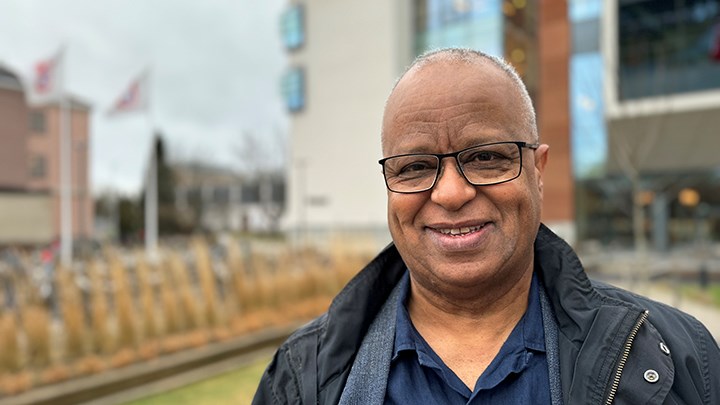Mussie Msghina – new professor 2025

Mussie Msghina is professor of medical science.
He now leads a research group that studies the physiological, anatomical, and neurochemical basis for mental health conditions.
“We use a combination of methods to understand normal function and abnormalities present in ADHD and schizophrenia – and how best to treat these disorders,” he says.
1959 Born in Asmara, Eritrea
1994 Obtained his PhD in physiology with his thesis Electrophysiological and electrochemical analysis of ATP and noradrenaline release from postganglionic sympathetic nerve terminals, Karolinska Institutet
1998 Docent in physiology, Karolinska Institutet
2024 Professor of medical science, Örebro University
Mussie Msghina is a consultant psychiatrist and expert on psychoses. He completed his undergraduate and doctoral studies at Karolinska Institutet in Stockholm.
“I began my doctoral studies while I was still in medical school as I have always been interested in the physiology of the nervous system. My department had a long tradition in the field, including the discovery of noradrenaline as a neurotransmitter in the nervous system.”
It was at the Department of Physiology and Pharmacology at Karolinska Institutet that Mussie Msghina began studying how neurotransmitters from sympathetic nerves regulate smooth muscle cells in blood vessels and the sperm duct.
“We were among the first to physiologically and pharmacologically describe the release of the neurotransmitters noradrenaline and ATP and how they interact in the contraction of smooth muscle cells. Several of the substances we studied are now used as medication for ADHD and depression, among others.”
Already as a PhD student, Mussie Msghina got involved in teaching, and for him, it involved the nervous system, the gastrointestinal tract, and the physiology of the cardiovascular system.
“Teaching gave me invaluable insights into how these organ systems use similar strategies and physiological processes, even though they have vastly different functions.”
Has drawn up national guidelines
Shortly after he obtained his PhD, Mussie Msghina took up postdoctoral positions at the University of Toronto and then at Oxford University.
As an expert on psychoses, he has held leading posts in both outpatient and inpatient care and has drawn up the national guidelines for the treatment of schizophrenia and schizophrenia-like illnesses.
“My studies of neurotransmitters such as noradrenaline, dopamine, glutamate, and gamma-aminobutyric acid (GABA) in fruit flies, rats, and crayfish have given me profound insights into brain functions and the treatment of mental health disorders – knowledge that I would not have gained solely through clinical work and research on humans.”
Enjoys teaching
In his current research, Mussie Msghina and his colleagues use a combination of functional brain imaging with MRI and cognitive tests before and after medication intake to understand normal function and abnormalities present in ADHD and schizophrenia.
At Örebro University, Mussie Msghina supervises doctoral students and teaches on the medical programme.
“I enjoy teaching students – and I believe it’s mutual since I was named ‘role model of the year 2023’ by the medical students.”
Mussie Msghina has had expert assignments with authorities, including the National Board of Health and Welfare, the Swedish Medical Products Agency, the Swedish Agency for Health Technology Assessment and Assessment of Social Services (SBU), the Swedish Ethical Review Authority, and the Swedish Association of Local Authorities and Regions. He is now a member of SBU’s scientific advisory committee.
“That experience has given me a broad perspective on how healthcare is organised at the national level.”
